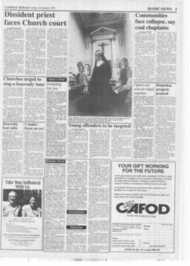Page 9, 16th October 1992
Page 9

Report an error
Noticed an error on this page?If you've noticed an error in this article please click here to report it.
Tags
Share
Related articles
Home News In Brief .
Arts Page Z11
Priest As Missions Promoter
Arts Page
Missionary Institute To Close Down
Mission countries return favour
Fr Aylward Shorter describes the 25 years of development at the Missionary Institute in north London, which celebrates its silver jubilee this week
AT a time when there is a growing shortage of priests and religious in Britain, it may seem surprising to find a large missionary college in north-west London, attended by more than 150 students, two thirds of whom are on the mainstream course.
It begins to make more sense When one notices that less than a quarter come from Britain and Ireland, and that the rest come Mainly from what we used to think of as the "mission countries" of Africa, Asia and Latin America, as well as from Eastern Europe. In fact, 34 nationalities are represented among the students, and the lecturers come from Britain, Ireland. Italy, Spain, Holland, America. Mozambique and Chile.
Most of the men and women who train at the Missionary Institute are destined to work in non-Western countries. but a few will be assigned to posts in Europe. The course of studies which they follow possesses a distinctly mission focus, and includes anthropology, the interpretation of cultures, evangelization and socioeconomic structures, Islam. African traditional religion and world religions.
The Missionary Institute in London is the largest Catholic missionary college in Europe, but what is it doing here?
Twenty five years ago, in 1967, the Mill Hill missionaries of St
Joseph's College and the White Fathers of St Edward's College. Totteridge, decided to amalgamate their teaching staff and programmes. In the following year, they were joined by the Consolata missionaries, the Verona Fathers, the Divine Word missionaries arid the Society of African Missions. Then, in 1969, the Congregation of the Holy Ghost also joined the project. The result has been to create a small missionary "university" in north-west London.
In 1972, the Vatican's Congregation for Catholic Education ratified the institute's affiliation to the Catholic University of Louvain (Leuven), and empowered the college to grant a Louvain degree in theology, as well as to confer diplomas and certificates of its own. The Missionary Institute was the first of several theological centres and seminaries in Britain to forge this link with Louvain.
In the following years, other missionary societies and religious orders joined the institute, among them the Montford missionaries, the Verona Sisters and the Sacred Heart Community. Since it opened, the Institute has prepared close on 500 candidates for the missionary priesthood, and about the same number of priests, religious and laity have obtained academic awards in the mainstream courses. Three graduates have become bishops. In addition, the institute runs other courses for religous, for returned missionaries, for teachers and in the near future for catechists. Fifteen years ago in 1977, the Institute acquired its own buildings. the former St Mary's Convent School, on the Ridgeway at Mill Hill.
In today's Church every country is, in some sense, a "mission country", and that includes Britain. A missionary is one who is called to cross human frontiers in order to proclaim the Good News of God's Kingdom. Britain, and especially London, is nowadays criss-crossed by numerous cultural and religious boundaries. Moreover, the majodty of its population is affected by a secular, technological culture, which is already beginning to spread like a virus to other parts of the world.
Students at the institute have a period of pastoral experience in a non-Western country as part of their missionary formation, but they also engage in pastoral activities in London. Here they can find representatives of every culture and religious faith in the world. they also come to know about the humanitarian, environmental and aid organizations based in London. Finally, they encounter, often with a degree of culture shock, a deeply secularized society. All of this is valuable experience for a missionary.
What does the local Church in Britain get out of the presence of a missionary institute in its midst?
Firstly. there is the witness of the on-going validity of the missionary vocation. Secondly, there is the rich exchange with people from other local churches, people with their own pastoral and theological contributions to make, and their own Christian experience to share.
Finally, there are courses for pastoral workers, religious, teachers and catechists which the institute organizes as a service for the local church in Britain. These special courses have a mission focus and draw on the experience and expertise of missionaries.
blog comments powered by Disqus













